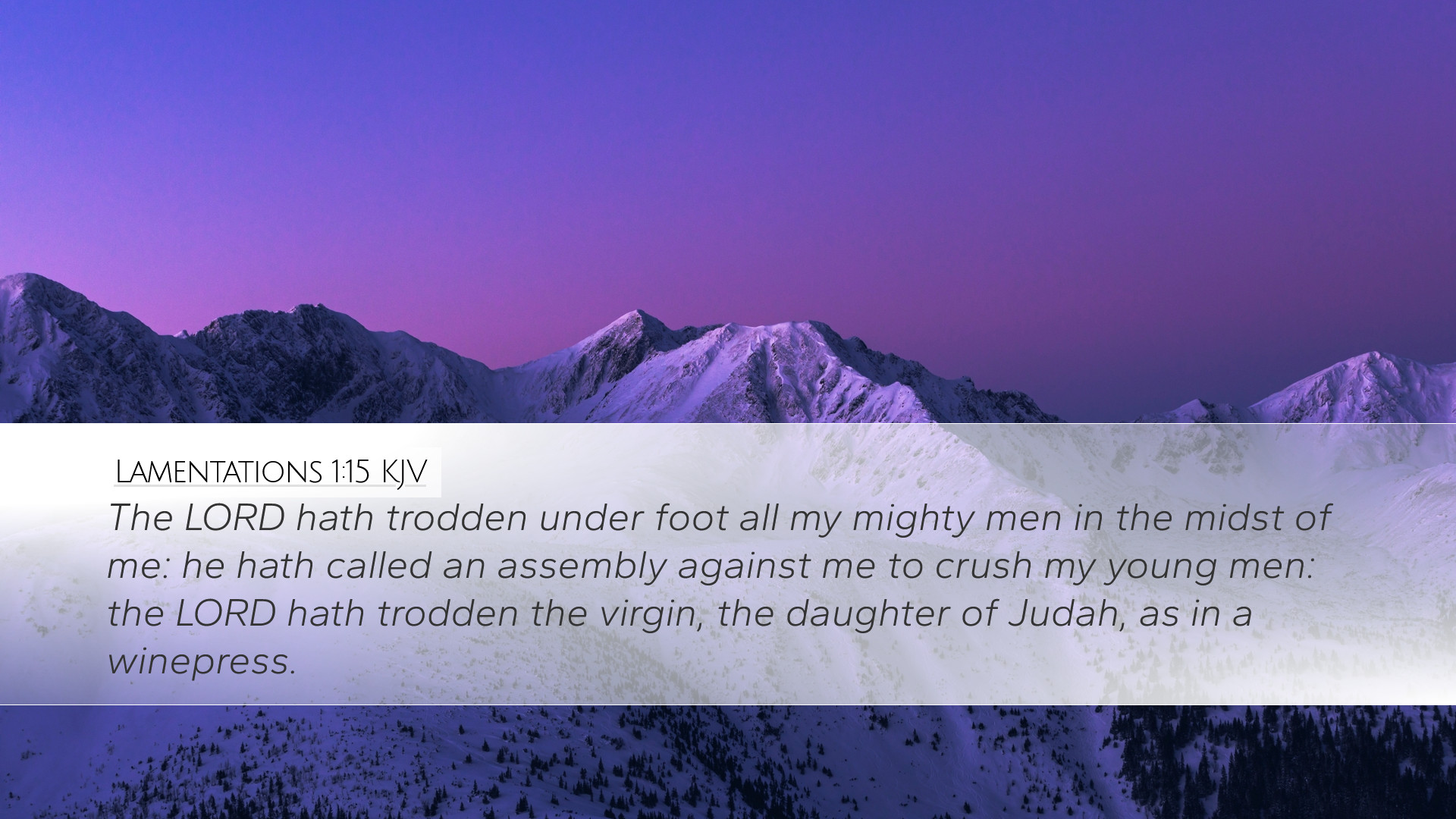Lamentations 1:15 Commentary
Verse Context: Lamentations is a collection of poetic laments for the destruction of Jerusalem. Chapter one focuses on the sorrows of Zion, personified as a grieving woman experiencing deep anguish after the fall of the city. The particular verse, Lamentations 1:15, addresses the severe trials faced by the Jewish people during the Babylonian exile.
Text of the Verse
"The Lord has rejected all the warriors in my midst; He has summoned an army against me to crush my young men. The Lord has trampled as in a winepress the virgin daughter of Judah."
Commentary Insights
1. The Judgment of God
Matthew Henry reflects on the severity of divine judgment, indicating that the Lord has set Himself against His chosen people due to their persistent disobedience and idolatry. The rejection of warriors signifies that God has removed His protective hand, leaving the inhabitants of Jerusalem vulnerable to their enemies.
2. The Symbolism of the Army
Albert Barnes notes that the "army" represents both a literal enemy force and the broader consequences of God's wrath. This army is described as an instrument of divine discipline, sent to enact the consequences of Israel's unfaithfulness.
3. The Crushing of the Young Men
Adam Clarke points out the tragedy of young lives lost in the devastation. The imagery invokes feelings of compassion and sorrow, reminding readers of the cost of rebellion against God. The loss of the "young men" symbolizes a generation swept away, which serves as a dire warning for future generations about the consequences of turning away from the Lord.
4. The Virgin Daughter of Judah
The phrase "virgin daughter of Judah" suggests innocence and vulnerability. In the viewpoint of Matthew Henry, this title emphasizes the tragic fall of what was once a pure and beloved city, now trampled upon. It highlights the extent of the nation’s shame and suffering, reflecting how sin leads to desolation.
5. Historical Context
This verse must be read in the larger context of the Babylonian exile. Albert Barnes provides insight into the historical setting, explaining the consequences that Jerusalem faced after years of neglecting its covenant relationship with God. The lament is a history lesson, emphasizing the need for faithfulness.
6. Implications for the Church
For contemporary believers, the struggles depicted in Lamentations serve as a timeless reminder of the dangers of spiritual complacency. As stated by Adam Clarke, the church must remain vigilant against the temptations of the world that lead away from God’s truth. The cry of the people reflects an urgent call for repentance, emphasizing that God’s mercy follows true contrition.
7. The Nature of Lament
The act of lamenting serves a dual purpose, as described by Matthew Henry. It not only expresses sorrow and grief but also serves to reaffirm faith in God, suggesting that even in the depths of despair, the people are encouraged to turn towards God in humility and seek His restoration.
8. The Theology of Suffering
The theological implications of suffering in the life of believers are profound. According to Albert Barnes, understanding suffering through the lens of divine judgment can lead to deeper insight into God’s character and His dealings with humanity. Suffering is never without purpose, and it is essential for believers to engage with their pain in a manner that leads to spiritual growth.
9. Concluding Reflections
The collective insights of these commentators guide us towards a holistic understanding of Lamentations 1:15. It encapsulates the tension between God’s holiness and grace, the consequences of sin, and the hope for restoration through genuine repentance. The verse stands as a poignant reminder of the fragility of life and the need for fidelity to God’s commands.
Application for Believers
- Introspection: Evaluate personal and communal faithfulness to God’s covenant.
- Repentance: Seek genuine repentance for areas of disobedience.
- Hope: Maintain hope in God’s ability to restore and redeem, even in dire circumstances.
- Community Support: Provide support to those suffering from the consequences of sin, encouraging healing and restoration.


